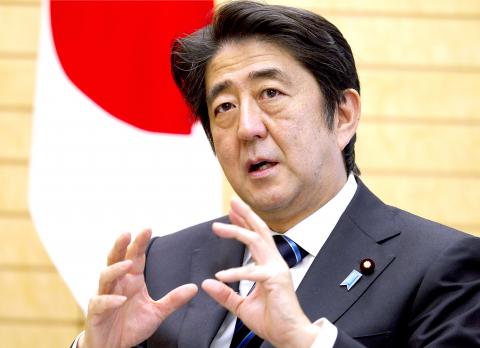Japanese Prime Minister Shinzo Abe called for a summit with Chinese President Xi Jinping (習近平) to reset relations after an escalation in bilateral tensions, invoking a 2006 visit to Beijing during his first administration.
“Since there are issues, it is all the more important to have a leaders’ meeting,” Abe said in an interview in the prime minister’s official residence in Tokyo. “I visited China as prime minister and met with [former Chinese president] Hu Jintao (胡錦濤) and we shared the view that we should develop our ties based on a strategic, mutually beneficial relationship. Now is the time to go back to that starting point.”
Abe’s call on Friday is his most explicit yet for a summit since China’s declaration last month of an air defense identification zone (ADIZ) that overlaps with Japan’s over the East China Sea.

Photo:Bloomberg
Abe has yet to hold a summit with either Xi or South Korean President Park Geun-hye, amid continuing territorial disputes with both neighbors. The impasse is a contrast from Abe’s 2006-2007 term in office, when he repaired ties with China that had frayed under his predecessor, former Japanese prime minister Junichiro Koizumi — whose visits to a national war shrine stirred Chinese resentment.
Asked whether China is open to a summit with Japan, Chinese Foreign Ministry spokesman Hong Lei (洪磊) told reporters in Beijing on Friday that “the problem is Japan cannot look straight at history and reality, and do the right thing on certain issues. So we once again ask Japan to look at history and reality, and pursue the same direction as China.”
The US urged China on Friday to set up an emergency hotline with Japan and South Korea to avoid confusion in its ADIZ.
Washington does not recognize Beijing’s ADIZ and has called on China not to press ahead with its implementation.
“As we work through this process, they need to do a few things right now to immediately lower tensions,” US Department of State deputy spokeswoman Marie Harf said.
“China should work with other countries, including Japan and South Korea, to establish confidence-building measures, including emergency communications channels to address the dangers that its recent announcement has created,” she added.
Meanwhile, Australian Minister of Foreign Affairs Julie Bishop defied a stern rebuke from Beijing yesterday to repeat concerns that the ADIZ has increased regional tensions.
“Australia is concerned about peace and stability in our region, and we don’t want to see any escalation of tensions, we want to see a de-escalation,” she told reporters in Beijing when asked about Australia’s stance on the ADIZ.
Her remarks came after China’s Minister of Foreign Affairs Wang Yi (王毅) on Friday reproached Bishop for Australia’s critical stance on the ADIZ.
Wang accused Australia of “jeopardizing bilateral mutual trust,” and said “the entire Chinese society and the general public are deeply dissatisfied” with Australia’s comments, Australian broadcaster ABC reported.
Bishop dismissed suggestions that the ADIZ dispute had damaged relations and said that negotiations on several issues, including a free-trade deal between the two countries, had been “productive.”

INVESTIGATION: The case is the latest instance of a DPP figure being implicated in an espionage network accused of allegedly leaking information to Chinese intelligence Democratic Progressive Party (DPP) member Ho Jen-chieh (何仁傑) was detained and held incommunicado yesterday on suspicion of spying for China during his tenure as assistant to then-minister of foreign affairs Joseph Wu (吳釗燮). The Taipei District Prosecutors’ Office said Ho was implicated during its investigation into alleged spying activities by former Presidential Office consultant Wu Shang-yu (吳尚雨). Prosecutors said there is reason to believe Ho breached the National Security Act (國家安全法) by leaking classified Ministry of Foreign Affairs information to Chinese intelligence. Following interrogation, prosecutors petitioned the Taipei District Court to detain Ho, citing concerns over potential collusion or tampering of evidence. The

Seventy percent of middle and elementary schools now conduct English classes entirely in English, the Ministry of Education said, as it encourages schools nationwide to adopt this practice Minister of Education (MOE) Cheng Ying-yao (鄭英耀) is scheduled to present a report on the government’s bilingual education policy to the Legislative Yuan’s Education and Culture Committee today. The report would outline strategies aimed at expanding access to education, reducing regional disparities and improving talent cultivation. Implementation of bilingual education policies has varied across local governments, occasionally drawing public criticism. For example, some schools have required teachers of non-English subjects to pass English proficiency

‘FORM OF PROTEST’: The German Institute Taipei said it was ‘shocked’ to see Nazi symbolism used in connection with political aims as it condemned the incident Sung Chien-liang (宋建樑), who led efforts to recall Democratic Progressive Party (DPP) Legislator Lee Kun-cheng (李坤城), was released on bail of NT$80,000 yesterday amid an outcry over a Nazi armband he wore to questioning the night before. Sung arrived at the New Taipei City District Prosecutors’ Office for questioning in a recall petition forgery case on Tuesday night wearing a red armband bearing a swastika, carrying a copy of Adolf Hitler’s Mein Kampf and giving a Nazi salute. Sung left the building at 1:15am without the armband and apparently covering the book with a coat. This is a serious international scandal and Chinese

NEGOTIATIONS: The US response to the countermeasures and plans Taiwan presented has been positive, including boosting procurement and investment, the president said Taiwan is included in the first group for trade negotiations with the US, President William Lai (賴清德) said yesterday, as he seeks to shield Taiwanese exporters from a 32 percent tariff. In Washington, US Trade Representative Jamieson Greer said in an interview on Fox News on Thursday that he would speak to his Taiwanese and Israeli counterparts yesterday about tariffs after holding a long discussion with the Vietnamese earlier. US President Donald Trump on Wednesday postponed punishing levies on multiple trade partners, including Taiwan, for three months after trillions of US dollars were wiped off global markets. He has maintained a 10 percent